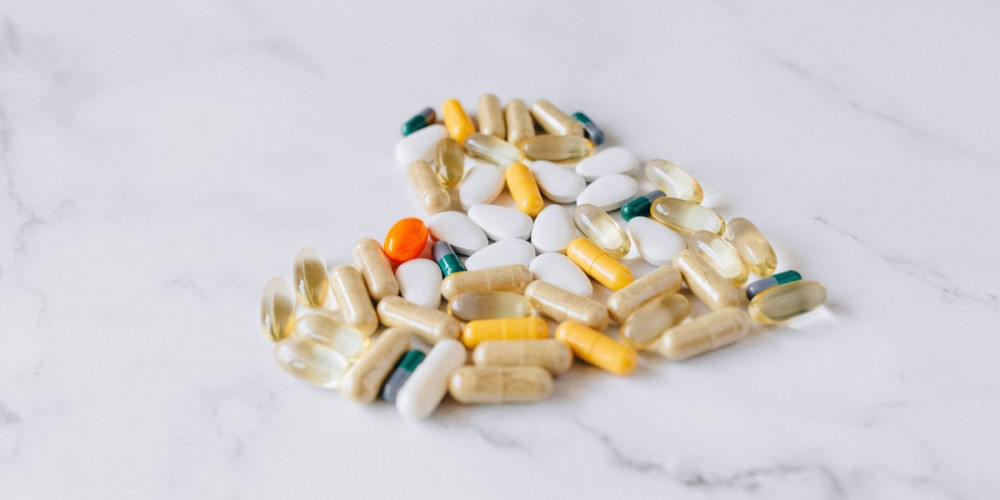
8 New Year’s Resolutions Worth Keeping
At the height of 2022, stats showed that almost half of Brits in the UK said they wanted to exercise more and eat more healthily in the New Year. 1 in 5 mentioned wanting to spend less time on social media.[21] We’ve heard these resolutions time and time again—change your diet, take up a new hobby, lose weight, be more present—and most of the time they don’t even seem attainable!
If you’re sick of the same old New Year’s resolutions and seeking goals that you can easily stick to, you came to the right place.
Here are 8 resolutions worth keeping this New Year:

1. Develop A Good Relationship With Your Body
We all know about the resolutions centred around hitting the gym or switching up your diet to lose weight. But what about a resolution centred around loving the body you’re in instead? While this can include working out more and eating healthier, it’s more so improving your self-confidence. You can start with a few self-improvement practices first:
- Your mind is a powerful place, so you should be mindful of your thoughts and feelings. Notice negative thoughts and replace them with positivity. Check in with yourself daily.
- Give therapy a try.
- Tell yourself daily affirmations every morning in front of a mirror.
- Be honest with yourself.
- Be patient and show yourself grace. Everything takes time!

2. Prioritize Your Sleep Schedule
You need to get more quality sleep. Without it, your health suffers.
If you’re one of many sleeping shy of 7 hours each night, you’re not getting the recommended amount of sleep—at least 8 to 9 hours for adults.[8,9,10]
This New Year, let’s make getting good sleep a priority:
- Set a time for yourself to hit the hay every single night (including the weekends) and be consistent about it.
- Cut back on caffeine and alcohol consumption.
- Make sure you have a calming bedtime routine set in place.
- Sleep for at least 8 hours per night minimum. Studies show that this extra sleep has a ton of benefits like boosting your mood, improving heart health, and sharpening brain function.[11]

3. Start Getting More Daily Exercise
We know this is one of those “basic” resolutions you’ve heard about time and time again. Don’t write it off so quickly, though.
You need exercise like you need water and a good night’s sleep. Depending upon the individual, your exercise needs can vary based on your needs, but we have some ideas for you. Trust us, your body will thank you!
- Start walking more instead of opting for other forms of transportation where you’re sitting or not moving much at all.
- Take the stairs instead of the elevator.
- Invest in a bicycle. Get that cardio in!
- If you have a dog, take them on at least three one-mile walks every day.
- Do some light yoga in the mornings before work or in the evenings before bed.
- Try to fit more exercise routines into your schedule. For example, maybe you spend an hour at the gym twice a week and do 30-minute workouts at home on two other days.

4. Revamp Your Diet With Supplements
Has your nutrition been lacking this past year? If you’re not getting enough vitamins and minerals in your daily diet, you may have noticed things like stress, an upset tummy, joint pain, a lack of motivation or focus, or other common issues.
Supplementation might just be the thing you need this New Year!
Here are a few of our top recommendations to get you started:
- Multivitamins: All-in-one health support.
- Vitamin deficiency is common but can be helped. Research shows that taking a multivitamin can boost your daily nutrition and help optimize your health.[12] Our Advanced Multivitamin contains 13 key vitamins, plus additional minerals to establish optimal health. Our formula contains ingredients that are clinically proven to help boost energy, promote cardiovascular health, support immune function, improve metabolism, support better vision, maintain teeth and gum health, protect joints and cartilage, and more.
- Ashwagandha Complex: Stress, anxiety, cognitive, and more support.
- Ashwagandha has been used for centuries as a natural mood enhancer and has been shown to scientifically ease stress, reduce anxiety, and improve overall cognitive function.[13] Our maximum strength Ashwagandha Complex contains 100% natural and highly absorbable KSM-66 Ashwagandha, essential B Vitamins, Rhodiola Rosea, L-Theanine, and Passion Flower to reduce fatigue, encourage sleep, boost energy levels and improve mood naturally.
- Turmeric Extract Complex: Joint pain, immunity, and more support.
- For centuries, turmeric has served as a primary health staple and ancient medicine for cultures across the globe. Our Turmeric Extract Complex contains potent doses of turmeric extract, black pepper extract, vitamin D, and vitamin C. Our formula contains up to 20X more curcuminoids than many competing brands and ensures optimal absorption, so you can take full advantage of the many health benefits that turmeric has to offer.
- Collagen Complex: Strong hair, skin, and nail support.
- Collagen is a primary building block in our bodies. As we age, we dramatically begin to lose essential collagen.[18] You’ll want a Collagen Complex specially formulated with hydrolysed marine collagen, the most environmentally-friendly type of collagen available. Luckily for you, our Collagen Complex has just that, plus it’s uniquely enhanced with Hyaluronic Acid and Sea Kelp.
- Omega 3 Fish Oil: Eye, heart, and brain support.
- Omega-3 fatty acids found in fish and fish oils have been shown to benefit cardiovascular health, vision maintenance, cognitive function, and even healthy pregnancies.[16,17,19] Our Omega-3 Fish Oil is potent and effective, not full of useless filler oil like other brands. We’ve carefully crafted our soft gels to deliver a wide array of health benefits by providing you with essential fatty acids your body doesn’t naturally produce on its own.

5. Boost Your Brain Power With Words
This one’s for you, bookworms! If you’re a novel connoisseur, or you just want to boost your brain power, try reading more this New Year.
Recent research has shown that reading fiction strengthens cognitive development and memory, increases empathy, and even decreases the risk of dementia in later life.[1,2]
We suggest checking out 10 new fiction books of your choice and setting aside time each day to read for at least one hour until you finish all 10.

6. Stop Sitting For Too Long
Sitting hunched over at your desk for 8 hours a day isn’t doing you much good. In fact, there are consequences to staying so sedentary throughout your day.
Science tells us that sitting in one spot for too long Studies can affect things like your mental well-being, and increase the health risks for obesity, associated non-communicable diseases, musculoskeletal issues, fatigue, and de-motivation.[3,4]
Instead of staying put, try to dedicate just 10 minutes of every hour to standing up at your desk or wherever you find yourself staying still for long periods.

7. Drink Two More Cups Of Water Every Day
According to recent surveys and research, the average Brit does not drink enough water to stay adequately hydrated.[5,20] The recommendation is 8 glasses of water per day, but to keep yourself hydrated you should also be[6]:
- Increasing your vegetable and fruit intake (they contain a heavy percentage of water).
- Drinking a glass of water with every meal.
- Drinking water before and after exercise.
- Drinking water when you’re hungry (sometimes thirst is mistaken for hunger).
If you’re not getting enough water in your daily diet, try to drink at least two more glasses of water per day this New Year.

8. Reach Out To Your Peers At Lease Once A Week
You need connection with other people to stay healthy - it’s science! Adults with strong friendships have been shown to have a reduced risk of things like depression, high blood pressure, and an unhealthy body mass index (BMI).[7]
Invest in the people you love by meeting up in person or catching up on the phone at least once a week. To make even deeper connections with your peers, you can:
- Stay in touch with people with whom you've worked or taken classes.
- Reconnect with old friends.
- Reach out to people you've enjoyed chatting with at social gatherings.
- Introduce yourself to neighbours.
- Make time to connect with family members.

How can I stick to my goals this New Year?
There is a method to the madness.
Sure, the statistics on how many people follow through and accomplish their New Year's resolutions are, well, bleak. If you don’t want to be just another one of the stats, we have a few tips and tricks to help you achieve your goals.
- Remember the S.M.A.R.T acronym when choosing your resolutions and goals.
- Is this goal Specific?
- Is this goal Measurable?
- Is this goal Achievable?
- Is this goal Relevant?
- Is this goal Time-bound?
- If you’re trying to break a bad habit this new year, you can start by breaking it down into five parts. For example -
- Bad Habit: “I don't get enough sleep at night.”
- Cue: “I feel like I need time to myself in the evening.”
- Routine: “I stay up too late watching TV.”
- Reward: “I'm entertained.”
- Way to change the behaviour: “Instead of staying up late to watch TV, carve out time each day to spend by yourself.”
- Make your resolutions personal, but be realistic and patient with yourself. Allow space for the inevitable hurdles that will pop up when trying to achieve your goals. Focus on what you’re doing well rather than the mistakes. You can do it!
Ready to get going on your resolutions? Let Hey Nutrition help. Supercharge your health with nature’s most powerful ingredients and click here to get started with Hey Nutrition today!
Resources:
- Fehl L. Shirley. (1969). Reading horizons: A journal of literacy and language arts. Scholar Works. Retrieved from https://scholarworks.wmich.edu/cgi/viewcontent.cgi?article=2743&context=reading_horizons
- Marshall, R. (2020, February 1). Reading fiction: The benefits are numerous. British Journal of General Practice. Retrieved from https://bjgp.org/content/70/691/79.short
- Eanes, L. (2021). Too much sitting: A serious 21st-century health risk. Latest TOC RSS. Retrieved from https://www.ingentaconnect.com/content/wk/nor/2021/00000040/00000004/art00005
- Gilson, N. D., Burton, N. W., Uffelen, J. G. Z. van, & Brown, W. J. (1970, January 1). Occupational sitting time: Employees? perceptions of health risks and intervention strategies. CSIRO PUBLISHING. Retrieved from https://www.publish.csiro.au/HE/HE11038
- Bda. (2019, August). The importance of Hydration. British Dietetic Association (BDA). Retrieved from https://www.bda.uk.com/resource/the-importance-of-hydration.html
- Popkin, B. M., D'Anci, K. E., & Rosenberg, I. H. (2010, August). Water, hydration, and health. Nutrition reviews. Retrieved from https://www.ncbi.nlm.nih.gov/pmc/articles/PMC2908954/
- Mayo Foundation for Medical Education and Research. (2022, January 12). The health benefits of good friends. Mayo Clinic. Retrieved from https://www.mayoclinic.org/healthy-lifestyle/adult-health/in-depth/friendships/art-20044860#:~:text=Friends%20also%20play%20a%20significant,body%20mass%20index%20(BMI).
- Mayo Foundation for Medical Education and Research. (2020, November 13). How to get a great nap. Mayo Clinic. Retrieved from https://www.mayoclinic.org/healthy-lifestyle/adult-health/in-depth/napping/art-20048319#:~:text=Napping%20offers%20various%20benefits%20for,Increased%20alertness
- Krans, B. (2019, September 15). Napping health effects. Healthline. Retrieved from https://www.healthline.com/health-news/is-napping-good-or-bad-for-your-health
- Can a nap boost brain health? Can a Nap Boost Brain Health? | Johns Hopkins Medicine. (2021, October 27). Retrieved from https://www.hopkinsmedicine.org/health/wellness-and-prevention/can-a-nap-boost-brain-health
- Vyazovskiy, V. V. (2015, December 17). Sleep, recovery, and meta regulation: Explaining the benefits of sleep. Nature and science of sleep. Retrieved from https://www.ncbi.nlm.nih.gov/pmc/articles/PMC4689288/
- U.S. Department of Health and Human Services. (n.d.). Office of dietary supplements - multivitamin/mineral supplements. NIH Office of Dietary Supplements. Retrieved from https://ods.od.nih.gov/factsheets/MVMS-HealthProfessional/#:~:text=Taking%20an%20MVM%20increases%20nutrient,from%20the%20diet%20%5B6%5D.
- Singh, N., Bhalla, M., de Jager, P., & Gilca, M. (2011). An overview on ashwagandha: A Rasayana (rejuvenator) of Ayurveda. African journal of traditional, complementary, and alternative medicines: AJTCAM. Retrieved from https://www.ncbi.nlm.nih.gov/pmc/articles/PMC3252722/
- Benjak Horvat, I., Gobin, I., Kresović, A., & Hauser, G. (2021, September 27). How can probiotics improve irritable bowel syndrome symptoms? World journal of gastrointestinal surgery. Retrieved from https://www.ncbi.nlm.nih.gov/pmc/articles/PMC8462084/
- EC; O. M. D. (n.d.). The history of probiotics: The untold story. Beneficial microbes. Retrieved from https://pubmed.ncbi.nlm.nih.gov/25576593/#:~:text=The%20history%20of%20probiotics%20goes,times%2C%20nearly%2010%2C000%20years%20ago
- Harris W. S. (2007). Omega-3 fatty acids and cardiovascular disease: a case for the omega-3 index as a new risk factor. Pharmacological Research, 55(3), 217–223. https://doi.org/10.1016/j.phrs.2007.01.013
- Coletta, J. M., Bell, S. J., & Roman, A. S. (2010). Omega-3 Fatty acids and pregnancy. Reviews in obstetrics & gynaecology, 3(4), 163–171. https://www.ncbi.nlm.nih.gov/pmc/articles/PMC3046737/
- Reilly, D. M., & Lozano, J. (2021, January 8). Skin collagen through the life stages: Importance for skin health and beauty. Plastic and Aesthetic Research. Retrieved from https://parjournal.net/article/view/3863
- DiNicolantonio, J. J., & O'Keefe, J. H. (2020). The Importance of Marine Omega-3s for Brain Development and the Prevention and Treatment of Behavior, Mood, and Other Brain Disorders. Nutrients, 12(8), 2333. https://doi.org/10.3390/nu12082333
- The science of hydration. British Nutrition Foundation. (2021, June). Retrieved from https://www.nutrition.org.uk/healthy-sustainable-diets/hydration/?level=Health+professional
- Armstrong, M., & Richter, F. (2022, January 11). Infographic: Top UK new year's resolutions for 2022. Statista Infographics. Retrieved from https://www.statista.com/chart/26578/uk-new-years-resolutions-for-2022-gcs/#:~:text=Almost%20half%20said%20they%20wanted,their%20time%20on%20social%20media.
